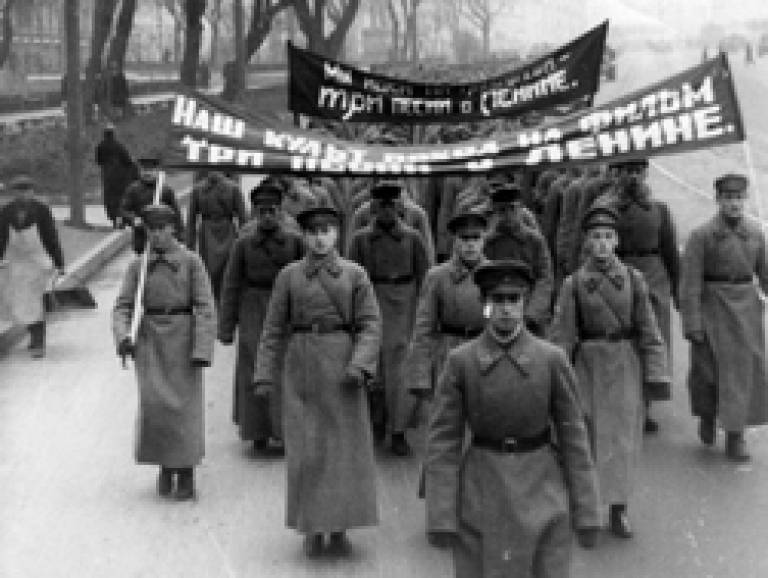Between detail and event: three versions of Three Songs of Lenin (Lilya Kaganovsky, University of Illinois, Urbana-Champaign)
12 December 2016, 6:00 pm–8:00 pm

Event Information
Location
-
Room 433, UCL SSEES, 16 Taviton Street, WC1H 0BW
What difference
does sound make to Three Songs of Lenin? What do we lose or gain with the
removal of the sound track?
In 1932, after making his last three feature films in Ukraine for the VUFKU film studio, Dziga Vertov was commissioned by Mezhrabpom-film to make a jubilee film about Lenin to commemorate the ten-year anniversary of Lenin’s death. The resulting film – Three Songs of Lenin (Tri pesni o Lenine, 1934) – has a complex history of both production and release. As far as we know, no copy of the original 1934 version survives, so we can only speculate from Vertov’s own writings, the film’s critical reception, metrics, censorship notes, and montage lists what the film may have looked like before it was recut and new footage added in the late 1930s and then recut again in the 1970s. This talk will follow on the problem of film “textology” introduced by Petr Bagrov in his September seminar for the RCRG, to think about the complexities of working with early Soviet cinema and the ways in which a single shot can radically alter the meaning of a film.
Lilya Kaganovsky is Associate Professor of Slavic, Comparative Literature, and Media & Cinema Studies, and the Director of the Program in Comparative & World Literature at the University of Illinois, Urbana-Champaign. Her publications include How the Soviet Man was Unmade (Pittsburgh, 2008); the edited volumes Mad Men, Mad World: Sex, Politics, Style and the 1960s (Lauren M. E. Goodlad, Lilya Kaganovsky and Robert A. Rushing, Duke, 2013) and Sound, Speech, Music in Soviet and Post-Soviet Cinema (Lilya Kaganovsky and Masha Salazkina, Indiana, 2014); and articles on Soviet and post-Soviet cinema. She is a member of the editorial board of the journal Studies in Russian and Soviet Cinema and regularly contributes film reviews to the on-line cinema journal KinoKultura. Her book on Soviet cinema’s transition to sound, The Voice of Technology: Soviet Cinema’s Transition to Sound, 1928-1935, is forthcoming from Indiana University Press in 2017.
A seminar hosted by
the UCL SSEES Russian Cinema Research Group.
Convenors: Dr
Phil Cavendish and Dr Rachel Morley
 Close
Close

